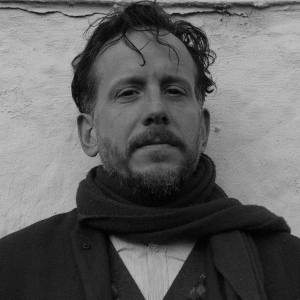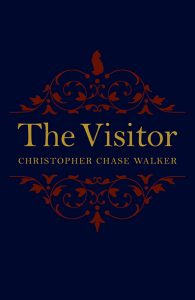
To celebrate the launch of The Visitor today, here's an interesting Q&A with its Brighton-based author, Christopher Chase Walker.
- Who are you and what do you do?
Christopher Walker was born in Maryland in 1969, on the same day Apollo 12 returned from the moon. He grew up in Cleveland, Ohio and earned a BA in English Literature from the College of Wooster.
Following university, Christopher lived in Chicago, Illinois, where he worked as a bartender, unloading trucks at a fine arts auction house, and then as charity fundraiser. He moved to London in 2001 and has raised millions for children’s and young adults’ charities in the UK and abroad.
In 2012, Acorn Independent Press published his first novel, Now You Know, and in 2014 his essay about baseball was published by the Guardian. He lives in Brighton in a slender house near the sea, and is married to the folk musician Mary Hampton.
***
That, above, is the official bio. More informally – I now run a very small charity that supports children’s and young people’s education. Most of our projects are in the developing world. This year, for example, we’ve refurbished a school for Syrian refugee schoolchildren who have fled to Lebanon, and support girls’ education (through building/refurbishment) in rural Malawi and rural Ghana. I was previously the fundraising director of a children and young people’s mental health charity. Prior to that, I worked for ten years at young homeless people’s charities in London. In Chicago, I worked at a child abuse prevention charity. All in all, I’ve been working at charities for twenty years, come early 2017.
- Name of your book and brief description?
The Visitor – Satan, in the form of a bewildered and naked old man, arrived in Brighton, England one December day. After twice being attacked on the streets, he discovers he has a mesmeric singing voice, and beguiles a young woman. She sees him as a beautiful young man, and searches for him everywhere. She finds him, on the night of the winter solstice, and vanishes. (Please see attached synopsis for more detail).
- What do you hope the reader will get from reading your book?
An atmosphere of early winter eeriness: the chilling wind, snow, fog, bare-branched trees, Satan hunting and beetling around in the shadows...and, complementing that, the jollity and comforts in the run-up to Christmas: your friends, log fires in pubs and at home, the smell of woodsmoke, food, hot drinks, fairy lights...
It’s generally not good to be prescriptive about these things, however I do think you come out on top if you read The Visitor in the run-up to Christmas, from mid-November on. In the same
way that you get more from reading things like The Great Gatsby in the summer, The Legend of Sleepy Hollow in the autumn, The Castle or The
Lodger in deep winter, The Visitor is, for my money, best read when the skies are growing darker every day and there’s snow or winter rain and you’ve bunked off work or school, or are
home in the evening and the doors are locked, the lights are low, a pot of tea or a whisky at hand…
As a child, what did you think you might do with your life?
My mum says I wanted to be a dustman (actually she said garbage man: it was in the States). It must have been the big trucks they drove. But I have no memory of it. Astronaut, at some point, I’m certain. I had a silver astronaut outfit I’d war to school. Songwriter, until I saw I was hopeless at music. Writer came later, when I was seventeen and read The Great Gatsby for the first time.
- Was there a point in your life where your view of the world/universe changed?
- What do you hope to be remembered for most?
To be remembered at all is good enough. Everyone can up their own minds the what, if there is what at all.
- With whom, living or dead, would you most like to have a conversation?
I’d like an afternoon playing horseshoes with Barak Obama. It’s a measured game, good for conversation and for taking the piss out of each other. That’d be a day: the June sun, a bit of shade when we need a break, an aluminium tub with iced drinks, a few sandwiches (or whatever) to soak up the ale. Get a few mates along and some music going…
- What key piece of advice would you give to your 16-year-old self?
You don’t have to please everyone, and you never will.
- Has there been a key teacher in your life?
I owe a great thank you to one of my university tutors, Debra Shostak
- What do you hope to achieve next in life?
Another book. And another one after that. And then some more.
- Why do you think the occult and fiction make good bedfellows?
Occult, if we were to consult to OED, stems from something like ‘hidden’ or perhaps shrouded – and a glimpse or knowledge of that which is hidden or shrouded. To catch glimpse of something – something generally unseen or perhaps forbidden from being seen – can be pretty alluring stuff. It’s got something of the night about it, something perhaps with a hint of taboo, something at once mysterious and known but supressed deep in our psyche.
To my mind, the allure of the occult also can operate in a similar way to, say, a secret passage behind a bookshelf. You see a sliver of light shining from behind the case, and it elicits in you curiosity, yearning, a thrill (a thrill, perhaps the same magnitude as sexual arousal). You’re excited by the mystery of it, the out-of-the-ordinariness of it, the spookiness of it.
Occult in popular terms – that is, if you went round asking people what they think ‘occult’ means – I’d guess that you’d get a lot about horror or terror, and a list of things like goat heads, satanic cults, goblets of blood and midnight rituals and other tabloid or pantomime stuff.
I disagree. I don’t think occult is the same as horror or gore. It’s much more subtle than that. Occult, to my mind, is mysterious, something eerie.
I can’t say that the occult and fiction make any better bedfellows than, say, love and fiction or espionage and fiction. Likewise I can’t say that I have any special knowledge of the occult or occult fiction. But I do know people like to be spooked and like to see the out-of-the-ordinary. It’s thrilling.
- What drew you to this genre?
I wanted to write something that I would like to read on a winter afternoon or evening. And figuring I’m not alone on that score, in wanting something eerie, something with fog and lantern light and darkness and snow, something that makes you look twice to make certain the front door is locked, something you’ll think about when you’re next out in the cold and the skies bruise and it’s only half past three in the afternoon…
by Christopher Chase Walker
The Master and Margarita meets A Christmas Carol in this powerful literary tale.
Satan, in the form of a bewildered and naked Old Man, arrives in Brighton one dark and snowy December morning. That night a gull kills itself trying to get at Lucy Cuthman, a charity worker in her early 30s, through her bedroom window. A thick fog descends over the city - and lingers. The Old Man is twice attacked on the streets, before finding the squat where Geoffrey Cantor, our cultured and Byron-quoting narrator, lives.
The Old Man discovers he has a mesmeric singing voice, and starts to busk around Brighton. He attracts the attention of Lucy, who is so diabolically enchanted that she can only see him as a beautiful young boy in need of help. In this guise, the Old Man visits her at work one evening - and promptly disappears. Hopelessly beguiled, Lucy searches everywhere for him. Meanwhile, mysterious bundles of money start turning up at her charity...
Categories:
0 comments on this article









